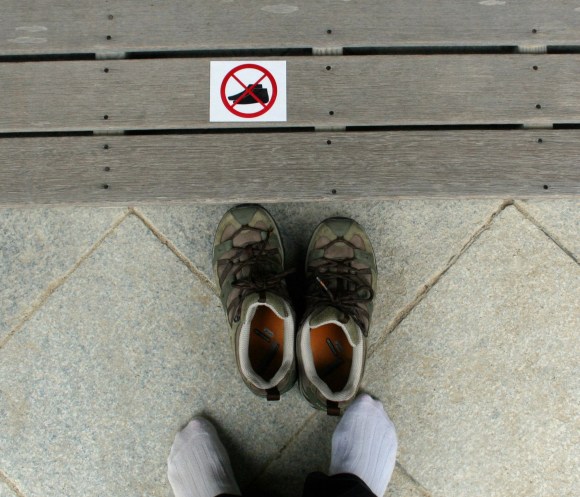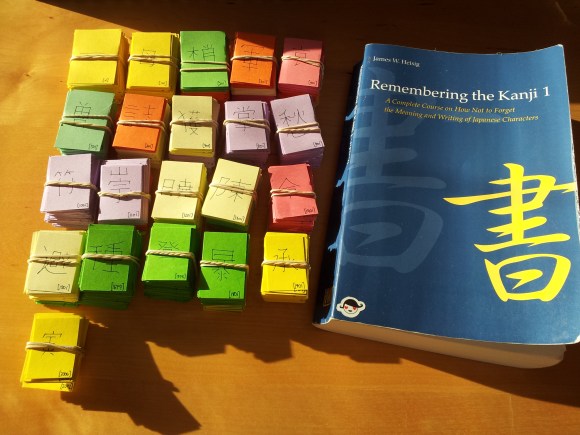
Ten years ago, I used to read a lot of books. Now, I read a lot of content, which is to say, blogs and online articles. But when I read something that sticks with me, even for a fleeting moment, I still want to reach for a highlighter and shade the words fluorescent yellow, so I can find that part again later. And I’m not alone in my instinctive response to treat the digital word in the same way I do printed material. There’s a reason browsers still call it a “bookmark” when we save a webpage.
There are all kinds of great English-language blogs about Japan out there. But there are also a number of stand-alone articles that, over the years, I’ve read again and again – and they still make me want to grab my highlighter and start collecting quotes. I’ve put them together into this short list, which we may think of as a small (highly subjective) foreigners-living-in-Japan canon: seminal pieces of writing from around the internet.
Some of these are very long. Some are controversial. All of them have stayed with me for some reason or another, and maybe they’ll stick with you too.
- How Discovering Japan Changed My Life – Danny Choo
Every so often, I’ll be talking to someone who’s into Japan and they’ll start telling me about this one super-long article they read by this guy one time. Sometimes they’ll tell me they read it twice in a row, and then went back again to look at the pictures properly. They’re talking about Danny Choo, whose account of how he learned Japanese and came to live and work in Japan has been providing “you can do it too!”-style motivation for otaku worldwide since its publication a few years ago.
For a whole generation of Japanophiles, Choo is quite literally living the dream. It seems like every other comment on Choo’s post (there are now over a thousand) calls him “an inspiration”, and it’s easy to see why:
“My dream came true. I was going to live and work in the land of the rising sun. All the hard work over the previous few years paid off. Discover and live your passion and the rest will just follow – it always does. Never give up.”
Not many people could write a blog post of their life story in such epic terms.
For me, the appeal also lies in Choo’s arresting old-school snapshots, from his teenage bedroom where Kylie Minogue posters compete for space with Mega Drive games, to his first days in Shibuya. These days, Japanese culture is instantly accessible to anyone with internet access – Choo’s tales of renting old unwanted videos of Japanese TV shows and borrowing a typewriter to make his own kanji charts is a reminder that it wasn’t always so.
- Why You Shouldn’t Learn Japanese – Ken Seeroi
In this witty and acerbic cost-benefit analysis of learning a foreign language, Ken Seeroi puts forward seven reasons not to bother. Speaking Japanese, he says, is statistically likely to be a waste of your time (seeing as you’ll burn out and quit anyway; and in that time you could have learned to play the guitar instead, and then you’d be getting lots of sex by now). You don’t need it, if you speak English. And speaking Japanese can even make you less popular. Seeroi is at his finest when comparing English speakers in Japan to David Blaine:
“Your magic trick is that you can speak English. That’s what everyone wants you to do. And every time you do it, and tell them about how big the cheeseburgers are back home and how people wear shoes inside the house, their eyes will light up and they’ll be like, wow, amazing!”
If Danny Choo’s why-Japan post inspires universal adoration, Seeroi’s ‘Why You Shouldn’t Learn Japanese‘ has as many detractors in the comments as it does fervent fans, perhaps in part because of its (brilliantly) controversial title. I don’t agree with everything he says, but I’m glad he took the time to say it.
- Japan: It’s Not Funny Any More – Tim Rogers
Living abroad can be a baffling and frustrating experience at times. In fact, if the country you live in – whether it happens to be the one in which you were born or not – is one you hold dear, I actually believe that makes it more ok to criticise the 10 things it gets horribly, horribly wrong, for example. If you don’t like to read criticism about Japan because you think it’s some kind of magical dream country where everything is perfect, however, you might not want to bother with ‘Japan: It’s Not Funny Any More’, an epic polemic that lays into just about everything in Japan. Anime, we are immediately informed, sucks; the food’s too meaty; work parties; comedy, pop music, movies; TV; the tape they put on your items in convenience stores; the weather; pachinko; stereotyping. Nothing is spared.
Reading ‘It’s Not Funny Any More’ is like being in an izakaya with your friend at 2am, when he’s had too many beers and just wants you to know how much he hates everything and wants to go home. Except, my drunk friends aren’t anywhere near as funny as Rogers, such as when he tears into Japanese television with its revolving door of the “famous-for-being-famous”:
“If Paris Hilton were Japanese, they’d literally have her anchoring the fucking national news.”
- On Awkward Acts of Generosity in Japan – Eryk Salvaggio
In this stellar post from his ‘This Japanese Life‘ blog, Salvaggio draws on an anecdote about his school lunch order to explore the everyday awkwardness of his life as an ALT in Japan, as an innocent query about the possibility of a spare lunch drags him into a “tangled web of reciprocity” with no hope of escape.
On the glorious ambiguities of the Japanese language and the potential for misunderstanding it brings, Salvaggio is priceless:
“Asking ‘I don’t have a bento today, right?”’ translates, in that hint-at-everything manner of Japanese communication, that maybe probably I was expecting bento.”
Salvaggio’s perceptive account of the lunch exchange brought me a shudder of recognition as I re-read it today that was half-schadenfreude, half sympathetic awkwardness.
- No Meaning No: How Learning Japanese Changed My Life – Conan Grames
Craving some of those positive vibes you got from reading about Danny Choo hopping off the plane at NRT with a dream and his cardigan? This wonderful essay from Conan Grames was posted by the American Association of Teachers of Japanese, and tells the story of his love affair with Japan. He came here as a Mormon missionary in 1966; and like Choo, he found himself “hooked” on the language and culture.
The enthusiasm he displays is contagious and (I hope) inspiring: “Now many [Japanese] speak fluent English, but how fun it is to be able to talk to them in their language.” Grames’s account of his Japan-focused career, and the delight and enrichment the language has brought him, serves as a rebuttal to Ken Seeroi’s suggestion that we shouldn’t bother after all. “There are other stories,” he writes;
“But the fact is that every job I have had in my very fun career has come to me because of my Japanese language and my experience in Japan.”
On the internet, of course, there is no canon – that’s kind of the point. But these are the highlighted and bookmarked pages of my life in Japan. It’s not all rosy, but it’s not half bad either. I’m out of suggestions now though, so over to you: what’s on your required reading list?
Featured image: OYTutorial






 “But we’re speaking Japanese!”: Humorous video confronts lingering stereotypes in Japan
“But we’re speaking Japanese!”: Humorous video confronts lingering stereotypes in Japan Experience the ultimate moe flight with Asian Air x Mirai Airlines
Experience the ultimate moe flight with Asian Air x Mirai Airlines Japanese expat remembers the words that changed his life when he started working in Australia
Japanese expat remembers the words that changed his life when he started working in Australia We accidentally dropped our newly hardened smartphone on the ground, but how is it?
We accidentally dropped our newly hardened smartphone on the ground, but how is it? RocketNews24’s six top tips for learning Japanese
RocketNews24’s six top tips for learning Japanese All-you-can-drink Starbucks and amazing views part of Tokyo’s new 170 meter-high sky lounge
All-you-can-drink Starbucks and amazing views part of Tokyo’s new 170 meter-high sky lounge McDonald’s new Happy Meals offer up cute and practical Sanrio lifestyle goods
McDonald’s new Happy Meals offer up cute and practical Sanrio lifestyle goods Mister Donut ready to make hojicha dreams come true in latest collab with Kyoto tea merchant
Mister Donut ready to make hojicha dreams come true in latest collab with Kyoto tea merchant Studio Ghibli glasses cases let anime characters keep an eye on your spectacles
Studio Ghibli glasses cases let anime characters keep an eye on your spectacles The oldest tunnel in Japan is believed to be haunted, and strange things happen when we go there
The oldest tunnel in Japan is believed to be haunted, and strange things happen when we go there Randomly running into a great sushi lunch like this is one of the best things about eating in Tokyo
Randomly running into a great sushi lunch like this is one of the best things about eating in Tokyo Starbucks reopens at Shibuya Scramble Crossing with new look and design concept
Starbucks reopens at Shibuya Scramble Crossing with new look and design concept Beautiful Sailor Moon manhole cover coasters being given out for free by Tokyo tourist center
Beautiful Sailor Moon manhole cover coasters being given out for free by Tokyo tourist center More foreign tourists than ever before in history visited Japan last month
More foreign tourists than ever before in history visited Japan last month Hamster abandoned at Tokyo ramen restaurant gets new home
Hamster abandoned at Tokyo ramen restaurant gets new home Disney princesses get official manga makeovers for Manga Princess Cafe opening in Tokyo
Disney princesses get official manga makeovers for Manga Princess Cafe opening in Tokyo Beautiful new Final Fantasy T-shirt collection on the way from Uniqlo【Photos】
Beautiful new Final Fantasy T-shirt collection on the way from Uniqlo【Photos】 Is the new Shinkansen Train Desk ticket worth it?
Is the new Shinkansen Train Desk ticket worth it? Foreign English teachers in Japan pick their favorite Japanese-language phrases【Survey】
Foreign English teachers in Japan pick their favorite Japanese-language phrases【Survey】 Japanese convenience store packs a whole bento into an onigiri rice ball
Japanese convenience store packs a whole bento into an onigiri rice ball We try out “Chan Ramen”, an underground type of ramen popular in the ramen community
We try out “Chan Ramen”, an underground type of ramen popular in the ramen community Studio Ghibli releases Kiki’s Delivery Service chocolate cake pouches in Japan
Studio Ghibli releases Kiki’s Delivery Service chocolate cake pouches in Japan Japan’s bone-breaking and record-breaking roller coaster is permanently shutting down
Japan’s bone-breaking and record-breaking roller coaster is permanently shutting down New definition of “Japanese whiskey” goes into effect to prevent fakes from fooling overseas buyers
New definition of “Japanese whiskey” goes into effect to prevent fakes from fooling overseas buyers Our Japanese reporter visits Costco in the U.S., finds super American and very Japanese things
Our Japanese reporter visits Costco in the U.S., finds super American and very Japanese things Studio Ghibli unveils Mother’s Day gift set that captures the love in My Neighbour Totoro
Studio Ghibli unveils Mother’s Day gift set that captures the love in My Neighbour Totoro Foreign passenger shoves conductor on one of the last full runs for Japan’s Thunderbird train
Foreign passenger shoves conductor on one of the last full runs for Japan’s Thunderbird train Domino’s Japan now sells…pizza ears?
Domino’s Japan now sells…pizza ears? New Japanese KitKat flavour stars Sanrio characters, including Hello Kitty
New Japanese KitKat flavour stars Sanrio characters, including Hello Kitty Kyoto creates new for-tourist buses to address overtourism with higher prices, faster rides
Kyoto creates new for-tourist buses to address overtourism with higher prices, faster rides Sales of Japan’s most convenient train ticket/shopping payment cards suspended indefinitely
Sales of Japan’s most convenient train ticket/shopping payment cards suspended indefinitely Sold-out Studio Ghibli desktop humidifiers are back so Totoro can help you through the dry season
Sold-out Studio Ghibli desktop humidifiers are back so Totoro can help you through the dry season Japanese government to make first change to romanization spelling rules since the 1950s
Japanese government to make first change to romanization spelling rules since the 1950s Ghibli founders Toshio Suzuki and Hayao Miyazaki contribute to Japanese whisky Totoro label design
Ghibli founders Toshio Suzuki and Hayao Miyazaki contribute to Japanese whisky Totoro label design Doraemon found buried at sea as scene from 1993 anime becomes real life【Photos】
Doraemon found buried at sea as scene from 1993 anime becomes real life【Photos】 Tokyo’s most famous Starbucks is closed
Tokyo’s most famous Starbucks is closed One Piece characters’ nationalities revealed, but fans have mixed opinions
One Piece characters’ nationalities revealed, but fans have mixed opinions We asked a Uniqlo employee what four things we should buy and their suggestions didn’t disappoint
We asked a Uniqlo employee what four things we should buy and their suggestions didn’t disappoint Princesses, fruits, and blacksmiths: Study reveals the 30 most unusual family names in Japan
Princesses, fruits, and blacksmiths: Study reveals the 30 most unusual family names in Japan Naomi Osaka shuts down reporter who asked her to speak in Japanese following Australian Open win
Naomi Osaka shuts down reporter who asked her to speak in Japanese following Australian Open win Let’s learn Japanese through terrible “American jokes”
Let’s learn Japanese through terrible “American jokes” Foreigners misreading Japanese kanji of “two men one woman” is too pure for Japanese Internet
Foreigners misreading Japanese kanji of “two men one woman” is too pure for Japanese Internet Boston theatre puts on play about Astro Boy and Tezuka
Boston theatre puts on play about Astro Boy and Tezuka Japanese woman stumbles on the power of the infamous “gaijin seat” phenomenon during flight
Japanese woman stumbles on the power of the infamous “gaijin seat” phenomenon during flight Japanese freestyle soccer maestro drops jaws with mind-blowing juggling skills in New York
Japanese freestyle soccer maestro drops jaws with mind-blowing juggling skills in New York What happened when Conan O’Brien visited the Toto Japanese toilet showroom in Tokyo 【Video】
What happened when Conan O’Brien visited the Toto Japanese toilet showroom in Tokyo 【Video】 Got a question for Haruki Murakami? Website lets you ask the author directly, and in English, too
Got a question for Haruki Murakami? Website lets you ask the author directly, and in English, too Are Japan’s efforts at internationalization succeeding or not?
Are Japan’s efforts at internationalization succeeding or not? Japanese Twitter user gives perfect comeback when grandma starts hating on video games
Japanese Twitter user gives perfect comeback when grandma starts hating on video games Sailor Moon Jimmy Choo collaboration adds Luna, Tuxedo Mask kiss, and Inner Senshi bags【Photos】
Sailor Moon Jimmy Choo collaboration adds Luna, Tuxedo Mask kiss, and Inner Senshi bags【Photos】 Our Japanese language reporter visits Barcelona, decides to try Spanish “hosho maki” sushi
Our Japanese language reporter visits Barcelona, decides to try Spanish “hosho maki” sushi Put away your textbooks, kids – the key to learning Japanese is Minecraft
Put away your textbooks, kids – the key to learning Japanese is Minecraft Our Japanese writer introduces some handy phrases so you too can speak the Kansai dialect!
Our Japanese writer introduces some handy phrases so you too can speak the Kansai dialect! Conan O’Brien lays out his case that anime’s Detective Conan is just a copy of him【Video】
Conan O’Brien lays out his case that anime’s Detective Conan is just a copy of him【Video】
Leave a Reply